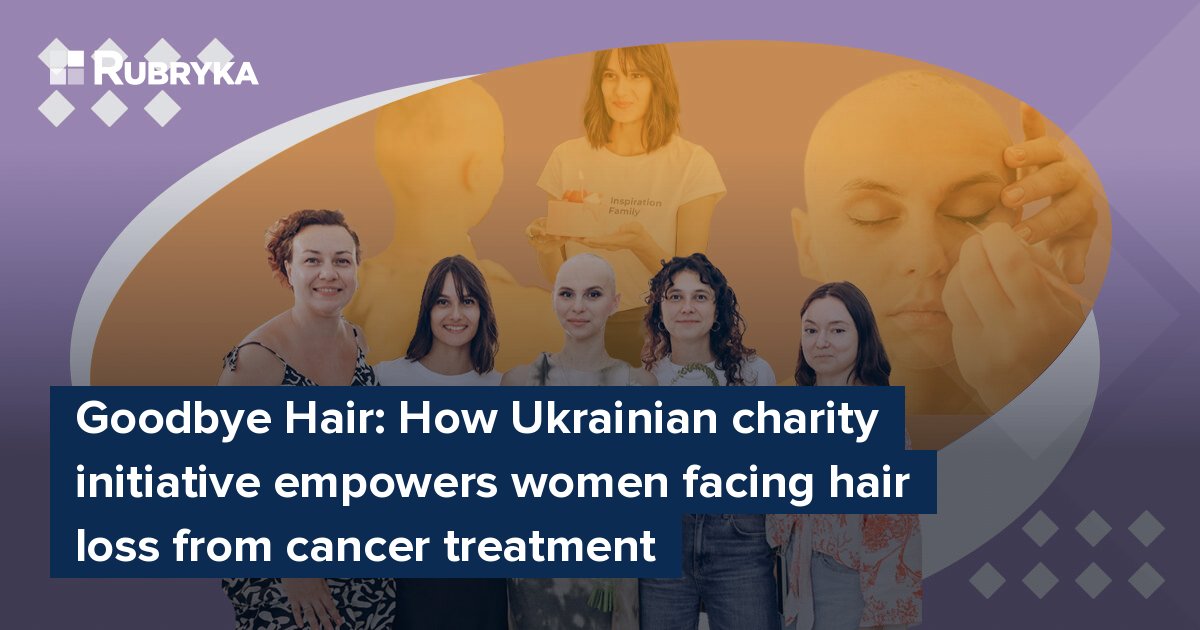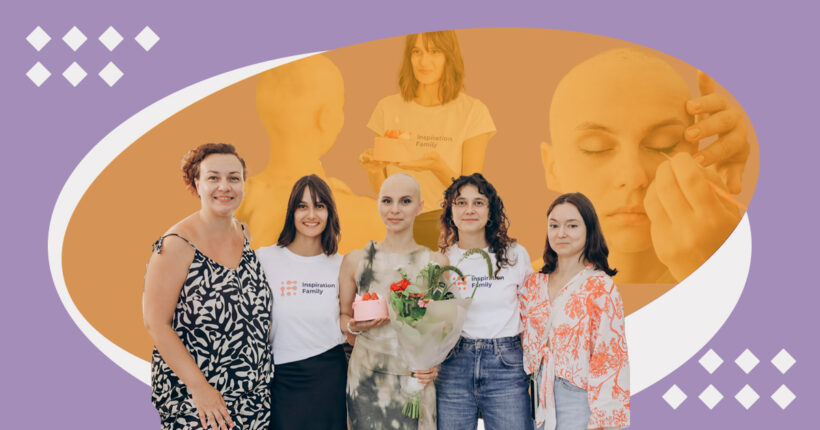
What's the problem?
Each year, over 50,000 women, on average, in Ukraine are diagnosed with cancer. According to the National Cancer Registry, over 63,274 women were diagnosed with cancer in 2021 and 54,625 — in 2022. About 65% of them will experience hair loss, also known as alopecia if they're treated with chemotherapy.
Hair loss is one of the most emotionally traumatic experiences for cancer patients because it's a visible sign of cancer treatment that impacts a person's sense of beauty and self-image and may change the attitude of people surrounding them.
What's the solution?
The Goodbye Hair project, launched by the Inspiration Family Foundation that supports adult cancer patients, helps women with cancer cope with the trauma of losing their hair due to chemotherapy. For women beginning their cancer treatment and knowing they will soon lose their hair, the foundation's team organizes mini farewell hair parties in Kyiv, where professional hairstylists, makeup artists, and photographers work with the women to work through the experience with empowerment.
How does it work?
"I didn't want anyone to pity me"
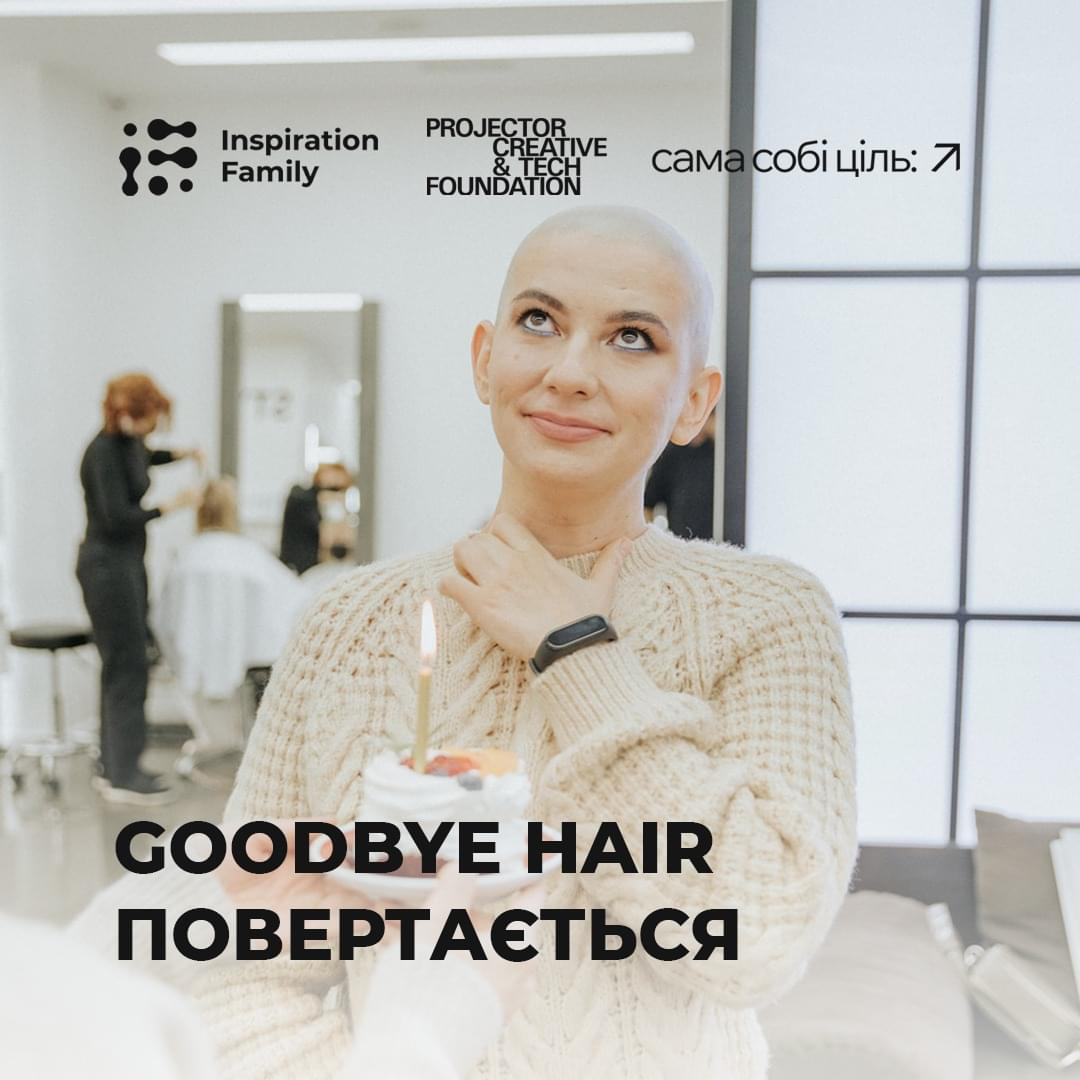
The promotional image of the Inspiration Family's project says, "Goodbye Hair returns."
Inspiration Family started "Goodbye Hair," a unique project for Ukraine, before 2022, when Russia began its full-scale invasion of Ukraine. Before the war, the project supported 21 women participants.
"The last Goodbye Hair project we did was in January 2022. Of course, after the invasion started, priorities shifted — we urgently needed to figure out how patients could continue their treatment during wartime," says Inesa Matiushenko, co-founder of the Inspiration Family Foundation. "The first few months of the war were the hardest for our entire team, with hundreds of requests and questions to which we had to find answers. In collaboration with European patient organizations, we coordinated sending patients abroad for treatment since the temporary protection status allows Ukrainians to receive medical care abroad for free."
After 2.5 years of war, the situation has somewhat stabilized. That's why the foundation decided to bring back the Goodbye Hair project.
"First and foremost, because we love it so much — it's emotional and heartwarming. We understand women need emotional support, especially those just starting their treatment," says Inesa Matiushenko. She and four other co-founders of the foundation have also gone through cancer treatment. Four of them lost their hair due to chemotherapy.
"When we were patients, we yearned to have a project like this," says the foundation's co-founder.
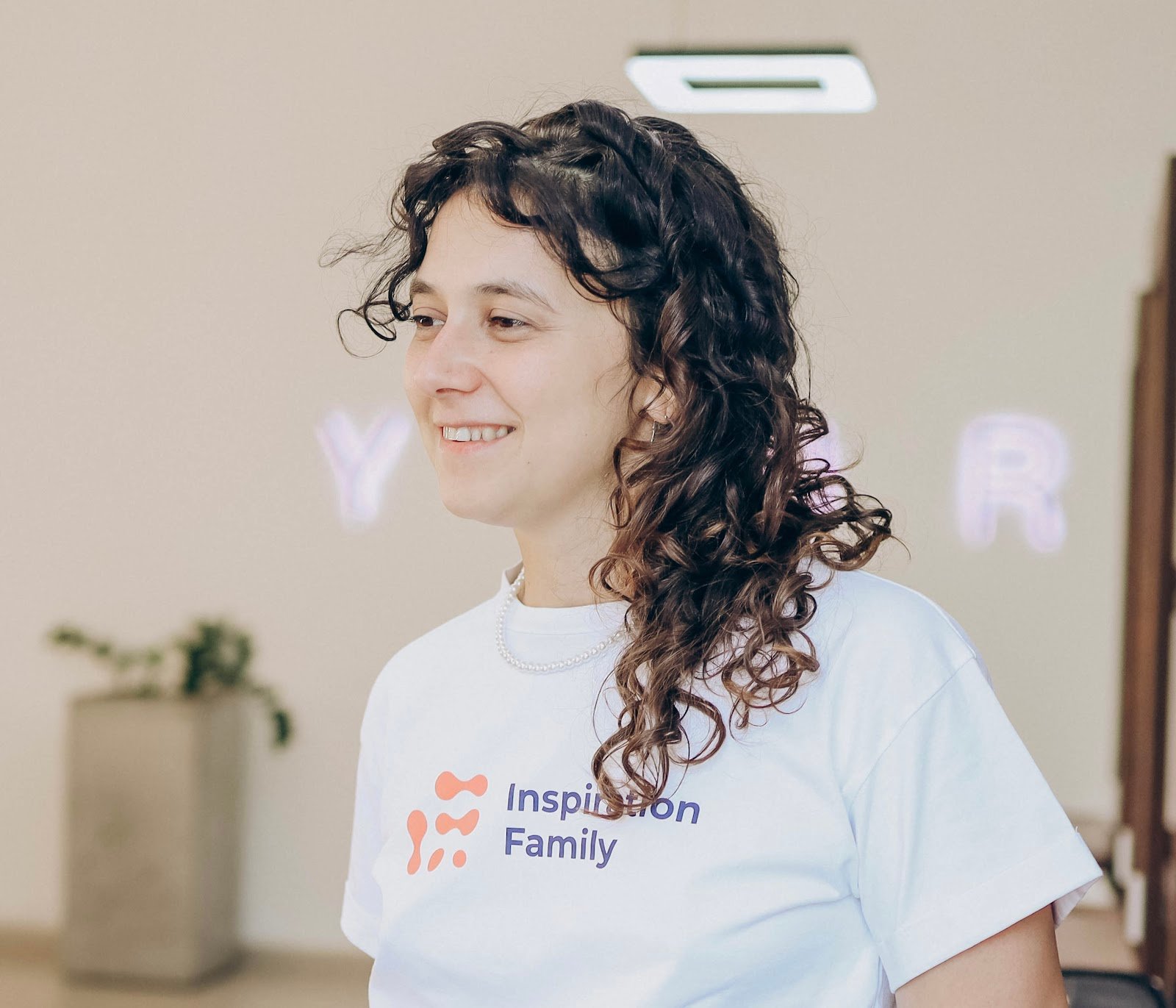
Inesa Matiushenko, co-founder of the Inspiration Family Foundation for adult cancer patients. Photo from the speaker's archive
Inesa Matiushenko shares that losing hair is traumatic for most women — it's about a sudden change in appearance and the visible indication that someone has cancer. She recalls that when she was first diagnosed with cancer, a friend shaved her head with a clipper in the kitchen.
"It never even crossed my mind to go to a salon because it's hard to imagine how I would explain to a hairstylist why I needed to shave my head," says Inesa. "I didn't want to tell a stranger that I had cancer, and I didn't want anyone to pity me or cry over me. My friend and I joked about it — we even bought a wig beforehand. It's hard to go through this alone, and you need support."
Inesa lost her hair twice. When her cancer returned, her boyfriend took on the role of the hairstylist. The couple turned the process into a game, gradually cutting Inesa's hair shorter and shorter, leaving a mohawk at the end, trying to make the experience as far removed from suffering as possible.
Other women involved in the project have similar stories: coordinator Olha Herdeha, photographer Nastoa Khokhlova-Nekrasova, and volunteer makeup artist and hairstylist Liudmyla Ahakkhanova have all been treated for cancer and lost their hair. Now, they support the project's participants, sharing their personal experiences and doing everything they can to make the women in the project feel that they are not alone and that others have also gone through hair loss, cancer treatment, and recovery.
"We're happy to turn this stressful moment into a positive emotional experience," the project organizers told Rubryka.
Their mission is to transform the forced haircut into an event filled with love and support.
What can Goodbye Hair participants expect?
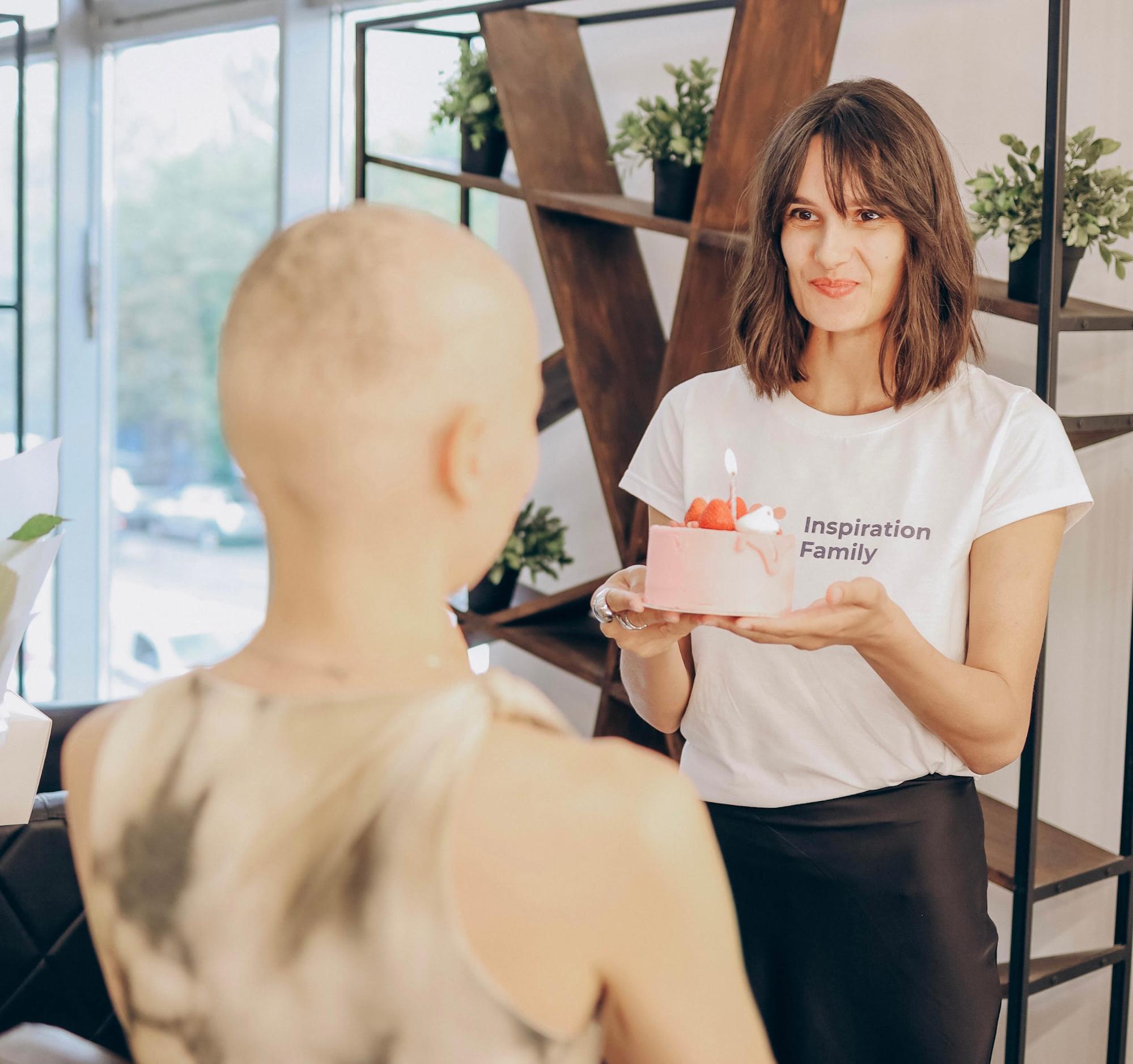
One of the gifts is a cake, on which participants can make a wish after blowing out the candle. Photo: Anastasia Khokhlova-Nekrasova
Any woman in Ukraine undergoing cancer treatment and losing her hair due to chemotherapy can participate in the project. To join, she just needs to fill out an application form. Once the application is received, a project coordinator will contact her to discuss all the details.
The specific type of cancer doesn't matter; the only requirement is that the woman can travel to Kyiv and attend the event. Participants will meet the project team at a beauty salon in Kyiv, where a hairstylist will cut their hair. People who have gone through similar experiences will be there to offer support. The woman can also bring someone close to her, making the experience more comfortable.
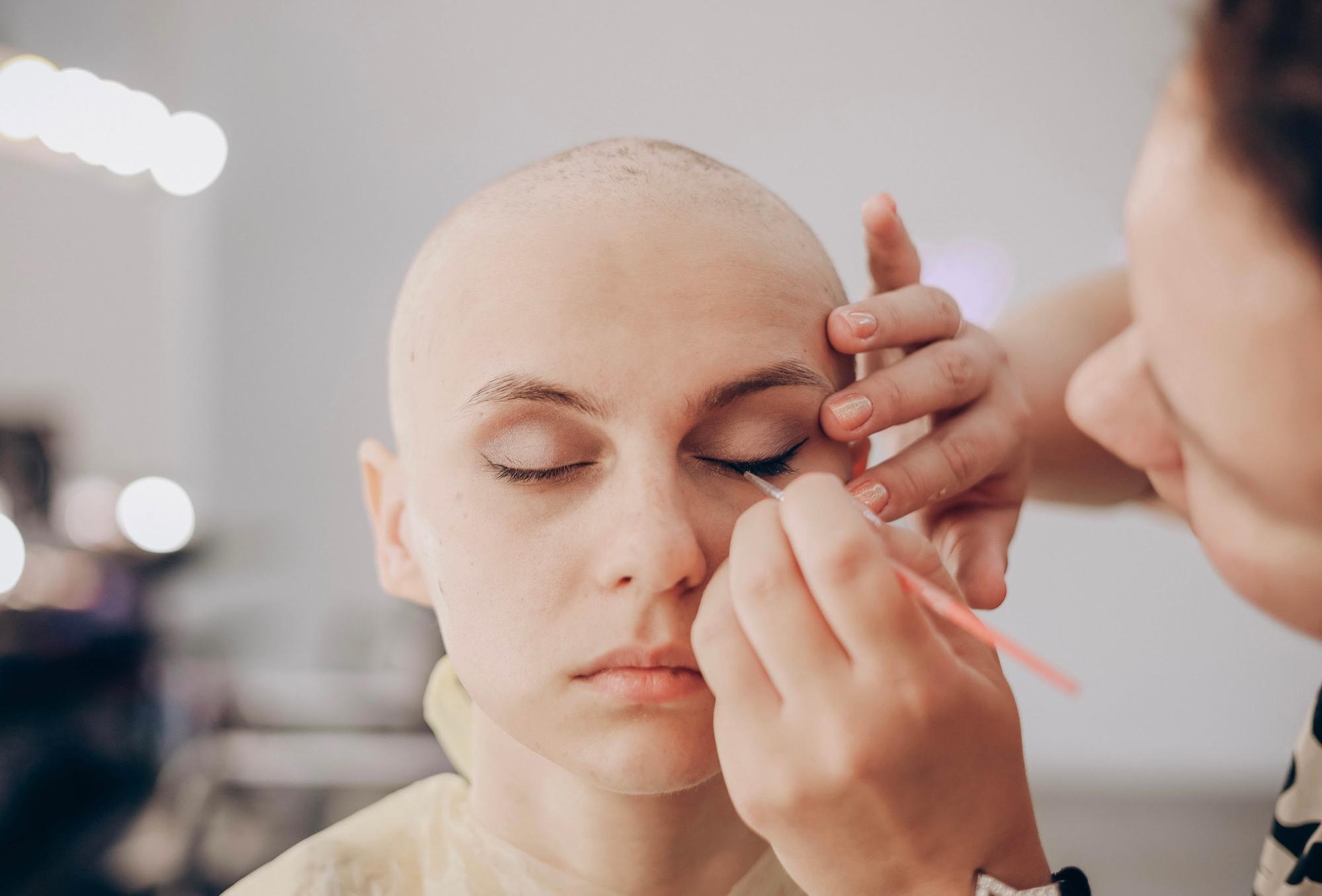
Makeup for the project's participants. Photo: Anastasia Khokhlova-Nekrasova
The organizers say a professional makeup artist will highlight the woman's natural beauty and the entire process of shaving her head, and a photoshoot of her new look will be captured in photos. These photos will serve as a reminder of her strength and confidence.
The event also includes a small party with cake and gifts from the project's partners as a reward for overcoming the doubts and fears associated with this challenging step. With the farewell to her hair behind her, the woman can now focus on the road to recovery.
Does it really work?
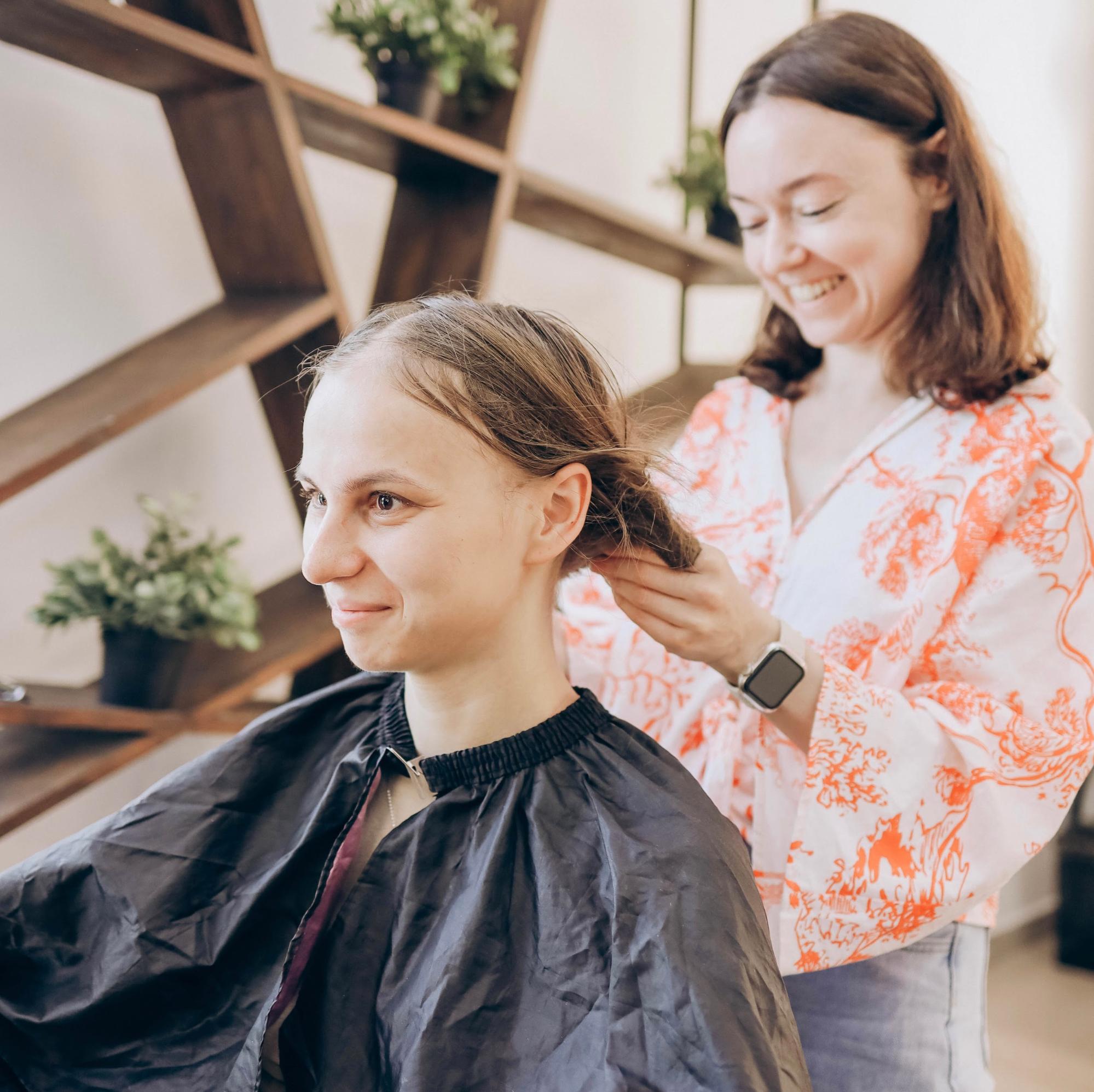
Veronika Fedorova from Poltava, an east-central city in Ukraine, is the first participant of Goodbye Hair 2024. Photo: Anastasia Khokhlova-Nekrasova
The first charity event of the renewed project took place in July, with Veronika Fedorova, a tattoo artist from the city of Poltava, as the guest of honor. Veronika is currently being treated for an ovarian cancer relapse in Kyiv.
Veronika says she had no doubts about participating in the project. Even before Inspiration Family announced it, she had been thinking about where she could do a similar "farewell to hair" in her hometown, but after chemotherapy, she didn't have the energy to organize it herself.
"I found out about it just in time and couldn't believe I would be the first participant," says Veronika. "The only thing that made me hesitate was that my hair had already started falling out badly, so I needed to cut it quickly. But I didn't want to go to a regular salon alone because I was worried they wouldn't understand. Sometimes, even when you want to cut your long hair into a bob, they try to talk you out of it, so shaving my head could have been a traumatic experience."
Without any hesitation, Veronika entrusted the process to the project team. She says the team's smooth work brought her positive emotions during the farewell to her hair and boosted her self-confidence.
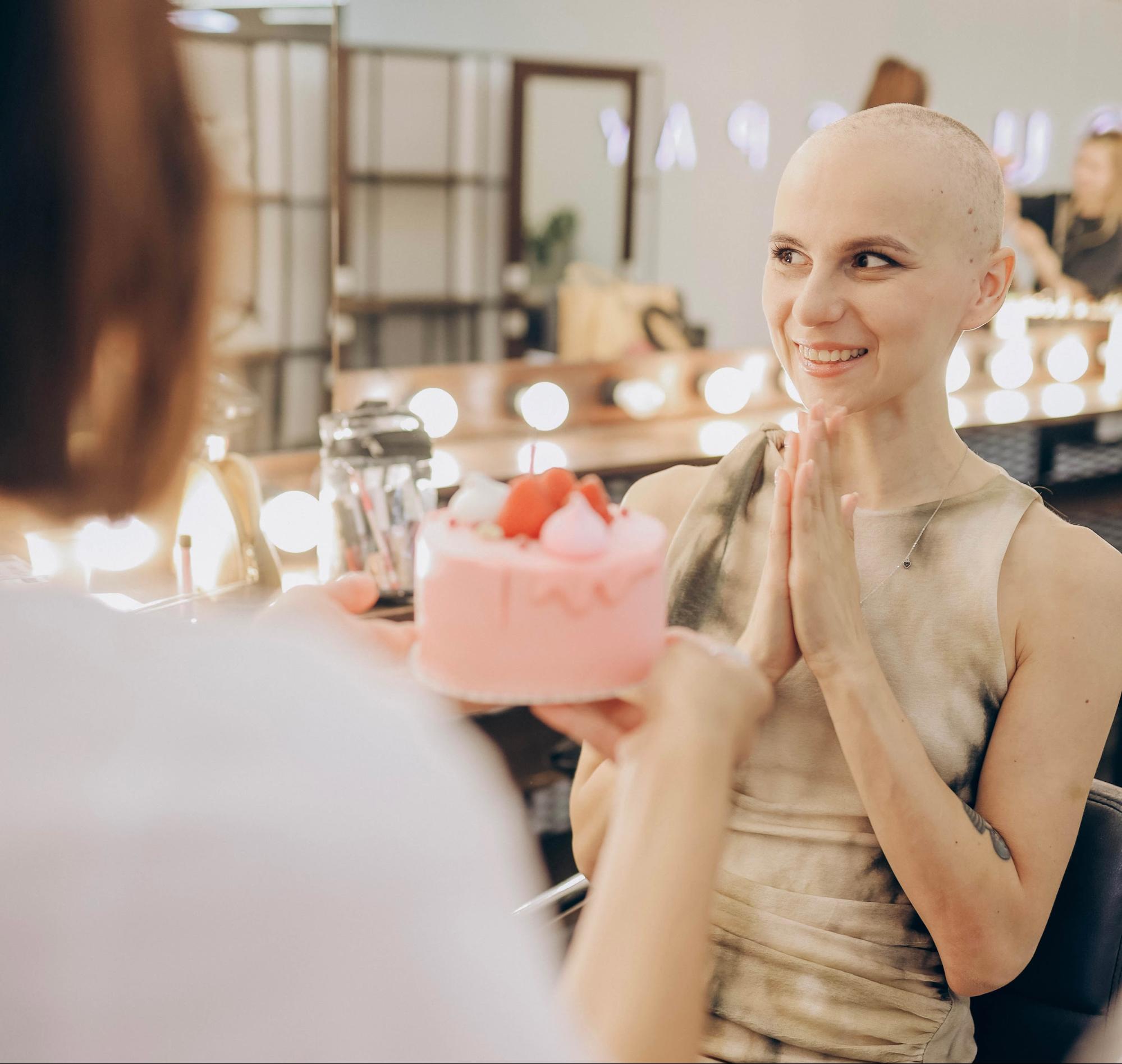
Veronika Fedorova after the haircut. Photo: Anastasia Khokhlova-Nekrasova
"When I saw the photos after the haircut, I was thrilled. They made me feel confident and highlighted my beauty, even without hair," Veronika says. "Now I feel like a model, open to collaborating with photographers and other interesting projects. Without the support of Inspiration Family, these thoughts probably wouldn't have crossed my mind."
More helpful solutions!
Challenging stereotypes
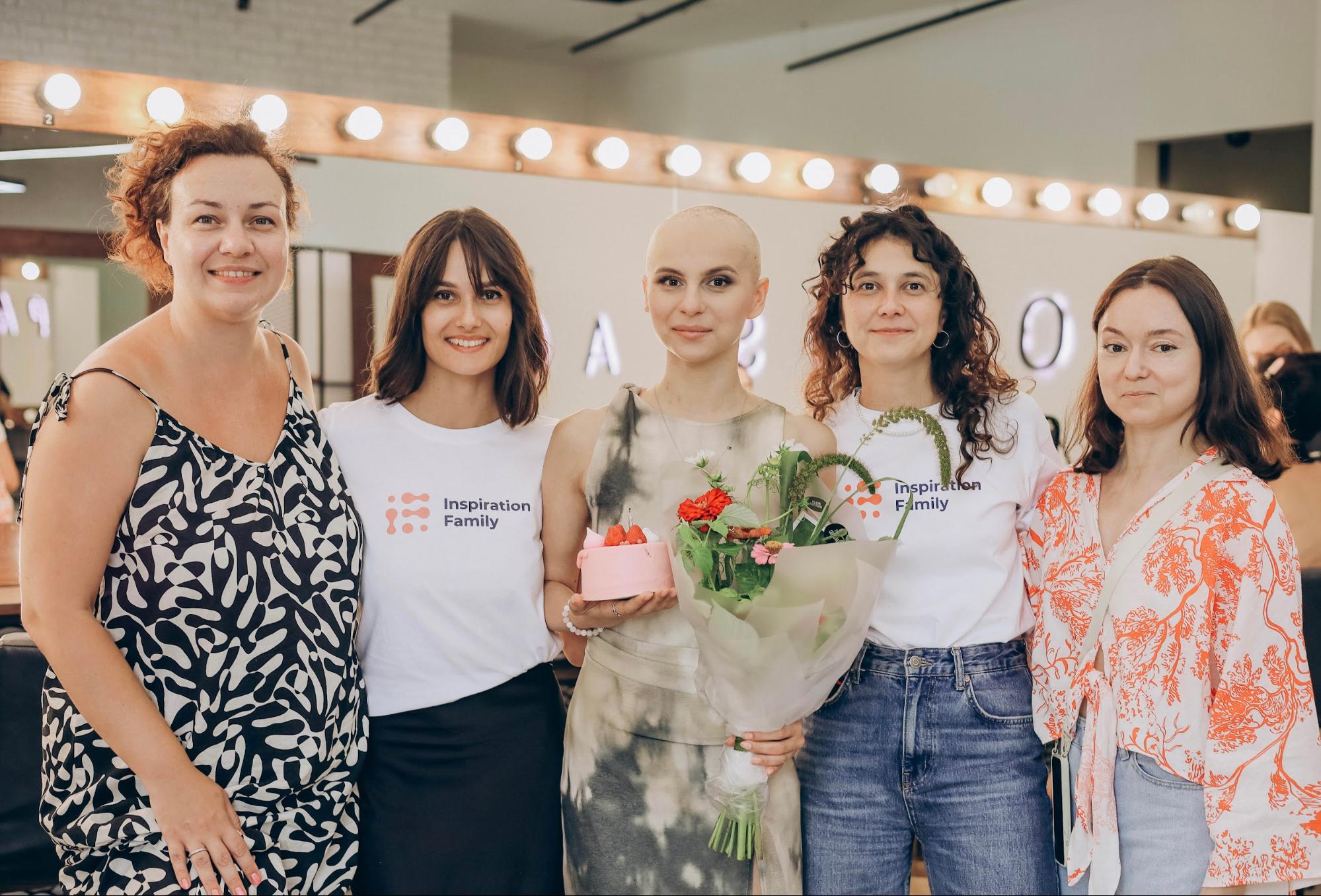
First charity party of Goodbye Hair 2024. Photo: Anastasia Khokhlova-Nekrasova
Most of the women who participated in the pre-war version of the project shared their experiences publicly and allowed their stories to be published. One of them even became the heroine of a TV segment documenting the entire process of saying goodbye to her hair. However, many women prefer to avoid public attention.
"Generally, people don't want to talk about having cancer. I think it's tied to the stereotypes and myths deeply rooted in our society," says co-founder Inesa Matiushenko. "I went through cancer treatment myself. I was diagnosed with stage 4 Hodgkin's lymphoma at 24, and only a few people knew about it because I didn't want to be seen as someone who was dying or pitied."
Inesa shares that she also heard stereotypical advice, even from those few people who knew about her diagnosis. "They suggested alternative medicine — eating garlic, drinking celandine juice, fasting, using live crayfish, and taking supplements. None of these things cure cancer, and they can steer a person away from proper treatment," says the Goodbye Hair co-founder.
Inesa Matiushenko says most people are psychologically vulnerable during this time and can easily fall for false information and myths about cancer. Unfortunately, in some cases, people died because they chose to reject evidence-based medicine in favor of anecdotal remedies.
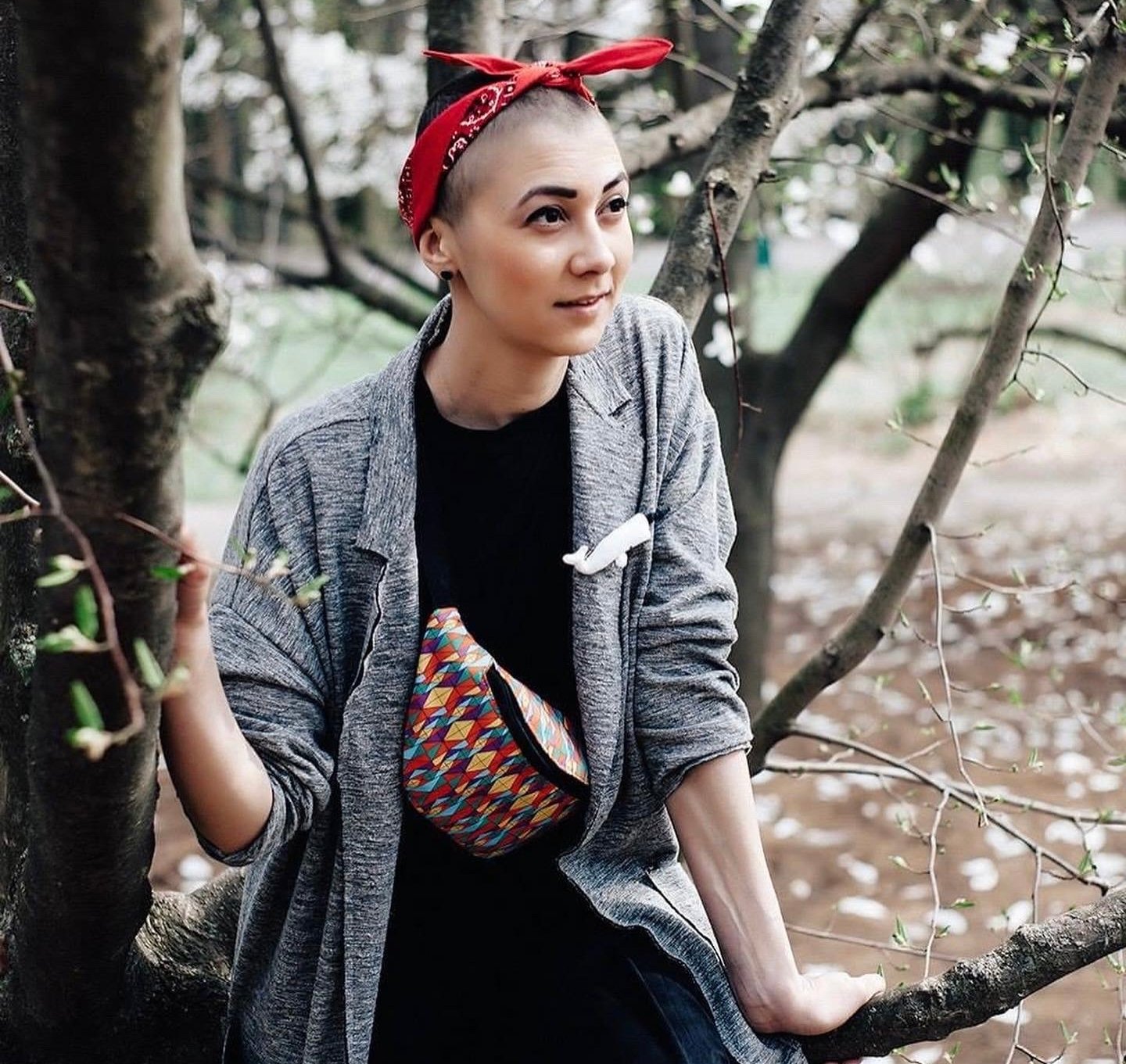
Inesa Matiushenko during treatment. Photo from the speaker's archive
Inesa says you don't even need a cancer diagnosis to attract unwanted attention.
"During the relapse, I was no longer afraid to appear without hair, but I constantly noticed people staring at me," says the project's co-founder. "I think this is on our society because you don't necessarily have to have cancer for people to look at you differently. Even a woman with a simple, short haircut can feel ambiguous reactions, perhaps due to stereotypical assumptions about sexual orientation, even though hair length doesn't determine that. So, our project isn't just about cancer patients."
Inesa Matiushenko adds that society tends to view people with a cancer diagnosis negatively, and some may even feel ashamed that they have cancer. This attitude is entirely abnormal and needs to be challenged and explained. The Goodbye Hair project helps remedy the situation by sharing the stories of women with cancer. The more people see these stories, the more naturally they will respond to individuals with a cancer diagnosis. By the way, the belief that all cancer patients lose their hair is also a stereotype. It all depends on the treatment protocol and diagnosis. Some therapies don't affect hair, which is also important.
The Goodbye Hair project is not just about supporting a specific person losing their hair and turning to Inspiration Family to make the experience less frightening. It's about going through the loss of hair in a safe environment among people who have also gone through it, where no one will ask uncomfortable or inappropriate questions and where one can relax and be themselves. This project fosters a culture of support for adult patients, making them visible in society and preserving their dignity. It's not the hair that makes a person who they are, so society should not judge people based on appearance.
"During and after the war, we will encounter more different people, including in their appearance," Inesa Matiushenko says, referring to Ukrainians affected by war. "We need to learn to be tolerant, to communicate and support people, and to see the person first, not their physical condition or diagnosis. We need to start learning this now."
How to support the project?
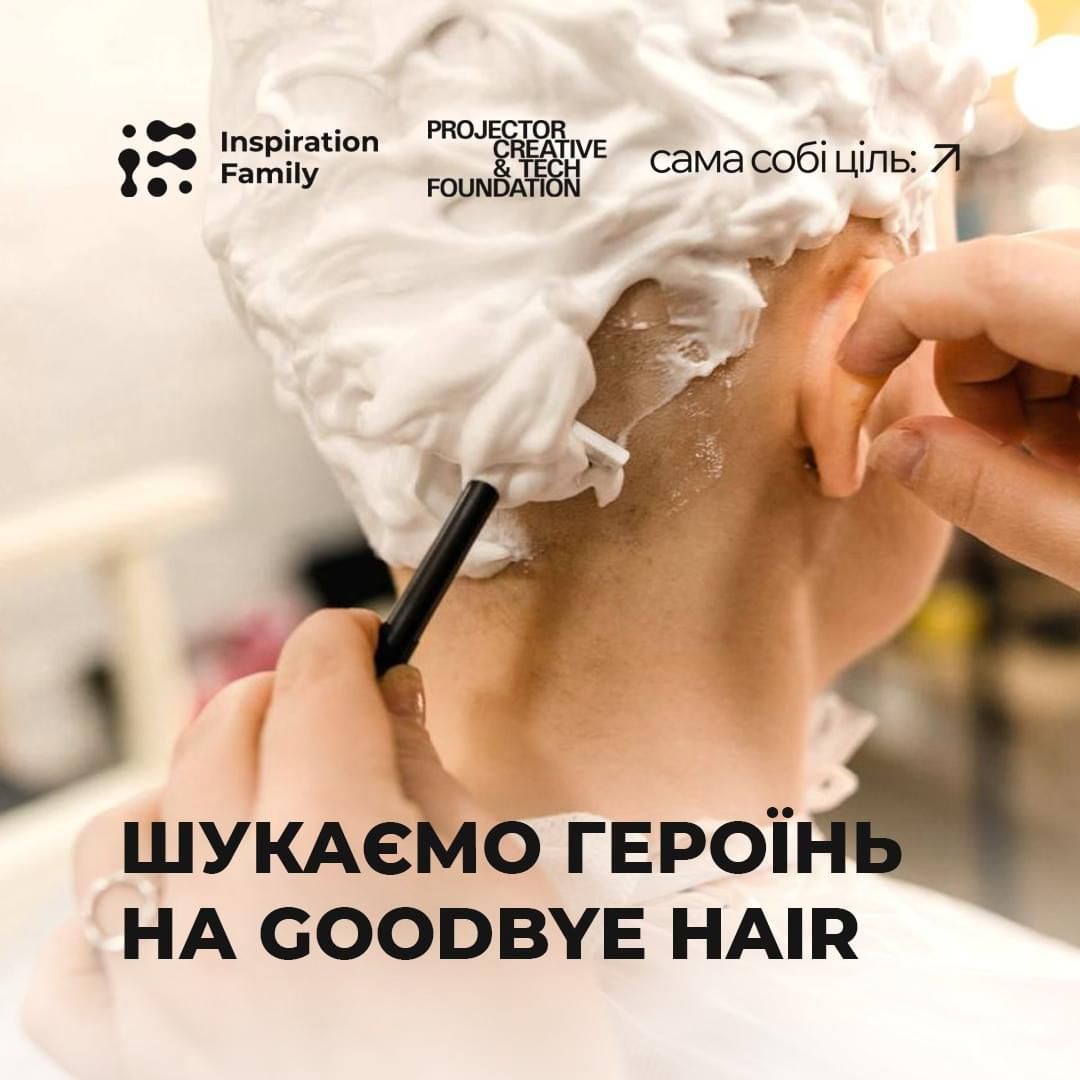
The promotional image of the Inspiration Family's project says, "Goodbye Hair searching for participants."
The project will hold 24 "goodbye-hair parties" throughout 2024, with one to two weekly events.
Want to support the project?
- Share this article so those needing this project can see it.
- Become a volunteer who helps the project coordinator during events, like a photographer or a makeup artist. If you want to volunteer, contact the foundation via email. "You might think our volunteers are only people with a history of cancer, but that's not true. We have makeup artists, hairdressers, and photographers who haven't gone through treatment but feel a deep connection to the project and want to be part of it," says Inesa Matiushenko.
To support the project, Inspiration Family is looking for partners who can help make the parties even more magical:
- A beauty salon where participants can get a haircut and makeup in an atmosphere of support and care;
- A brand of headwear or scarves to gift a new accessory to the participants to match the new hairstyle;
- A jewelry brand.
Inspiration Family currently doesn't have the means to expand the project's geographical reach. Still, if patient organizations or individuals are ready to launch such a project in their city, Goodbye Hair is willing to share their experience and the steps needed to bring the project to life.
Background: The Goodbye Hair project is implemented by the Projector Foundation as part of the You Are Goal program with support from the US Agency for International Development (USAID) and Ukraine Confidence Building Initiative (UCBI).


